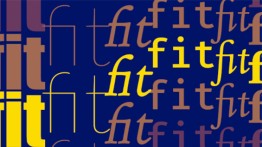Thinking About Talking About Spacing
Monday, September 28, 2020, 12:30 - 2pm

In type design, professionals often discuss letter spacing in binary terms: good or bad, right or wrong. But that language belies the influence of designers' decisions and the broad range of legitimate opinions about when — and where — the spacing of a typeface succeeds or fails. Nathan Willis' research deals with the practical problem of assessing spacing on its qualitative merits, while looking for some quantitative way to separate the truly excellent from the barely acceptable. This talk will explore how designers talk about spacing and how Willis attempts to link what we say to what we really mean and, hopefully, to the decisions we make as we design typefaces.
Nathan Willis is a Ph.D. student at the University of Reading and a 2017 graduate of the MATD program. His research, supervised by Dr Fiona Ross and Dr Matthew Lickiss, explores algorithms for spacing, kerning, and letter fitting across typographic styles and writing systems. When not researching space, he writes about the software side of text shaping in open-source projects. He originally hails from West Texas, yet has never owned a horse. He currently lives in London.




